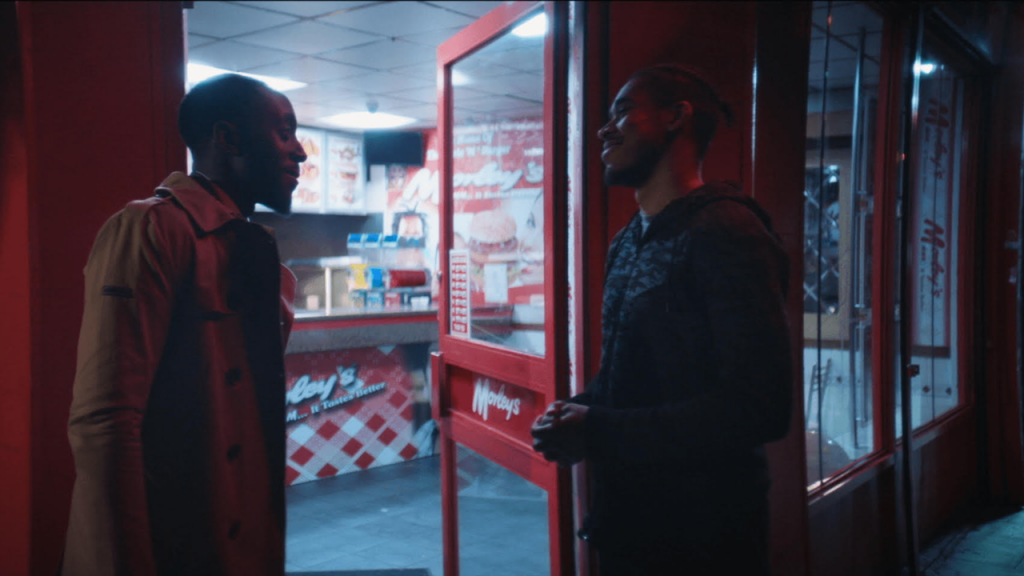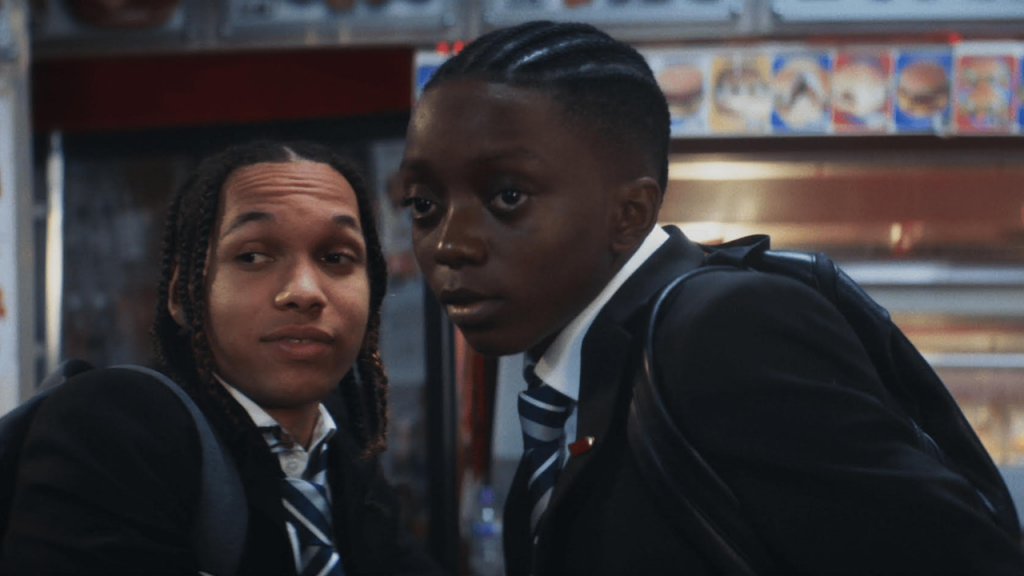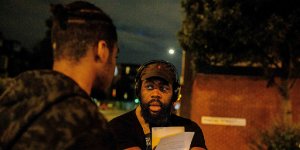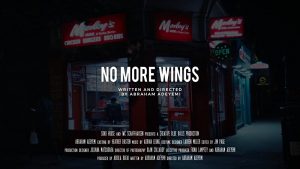Abraham Adeyemi’s “No More Wings” Celebrates Flying Too Close to the Sun

“Six wings and chips, twice.” No More Wings opens with an order. It’s a typical order, one that is familiar, memorized and well worn. You couldn’t go into some ubiquitous McDonald’s and casually place this slang-laden order, no; you can only make this order at a place that you knew, where you had history. In this case, it was the neighborhood chicken shop, Morley’s, in South London. No More Wings tells the story of the men placing this order – one who is returning to his past, and one who never desired to leave it.
Abraham Adeyemi’s directorial debut, No More Wings, manages to tell an in depth and engaging story in the amount of time it takes Isaac (Ivanno Jeremiah) and Jude (Parys Jordon) to reunite at their childhood hangout and catch up. It’s such a fascinating thing, these ten minutes that tell not only the lives of our two protagonists, but also those lives of South Londoners, or Americans, of anyone who had goals and dreams and the obstacles that can sometimes arise when trying to complete them.
The beauty of No More Wings lies in the telling, which is to say, they don’t tell, they show. Every sentence is an allegory, every frame a parable, and yet, the lesson is not heavy-handed, and in fact, it’s very open-ended. The title reminds me of the fable of Icarus, whose wax wings ended up being his undoing as he flew too close to the sun. In the film it can be hard to determine which young man is the Icarus, even though at first glance the choice may seem obvious.
The story revolves around the two men, and during the film we flash back to their younger selves. Young Isaac (Joshua Cameron), is a bright-eyed boy who seems very practical about his ambitions. Young Jude (Tyrus McKenzie) still seems to be searching for his dream. He’d tried sport, and now music seemed to be calling. Young Isaac looks to his wistful young friend, and back in the present, his older counterpart remarks,
“Not all of us were blessed with a thousand natural gifts, some of us just had to get a degree.”

It’s a small statement with big implications. Isaac has come back to South London to meet up with Jude. His success is shown in the watch he wears and the prim cut of his suit. He’s just bought a house in an upscale neighborhood and he’s excited to share the news. He still belongs – he’s the one who places the order with ease – but he recognized his need to leave in order to better himself, something that Jude disagrees with.
“What about those left behind? How they gonna know they can get better?”
In an exclusive Q&A, Adeyemi, along with stars Jeremiah and Jordon, producer Abiola Rufai, and cinematographer Olan Collardy, discussed the film’s themes. Adeyemi says this push and pull defines the question of the film, should you stay or should you go?
Abraham Adeyemi: Do you leave home, or do you stay? Is it selfish or is it selfless? How can you expect somewhere to get better if those who cared about it and it means so much to are no longer there? Whether it’s to reap the benefits of it getting better, but also to play a part in it getting better.
–

It’s a struggle without an answer and one that is handled beautifully in the film. Each man, though they have much the same background, struggle to define not only what success looks like, but also, how to get there.
During the panel, I asked a question about the element nature vs. nurture played in the film.
The Geekiary: I found it interesting that Jude as a child was the one who seemed to be more fancy free – wanting a career in music and being naturally bright and smart, whereas Isaac was much more pragmatic. Tell us about the nature/nurture element of that. Making your own destiny vs. maintaining the status quo. Jude was resolved to stay himself and not change while Isaac was resolved to change to obtain a measure of success.
AA: I think they’re more similar than they realize as adults and that’s shown in their childhood when they’re very much the same person. When people ask me, why does one turn out differently than the other, I think in the case of those two men, Isaac was more focused and Jude has an insatiable personality with a lack of patience.
–
In the film there are shades of this, but you also see irregular circumstances have hampered Jude’s momentum. Can this be the cause for his lack of success? Or is it a byproduct of his insatiable and impatient nature? These are just a few of the thought points the movie presents in a way that challenges you without provocation.

This is a universal story, but there is something to be said for the race allegory throughout. Adeyemi took care to represent not just Black men, but different shades of Black men, as that can feed into the way the world views them. However, he wouldn’t necessarily say that his characters are hampered by racism, but he can’t say it doesn’t play a role.
AA: Everyone is born with a different set of cards in their hands, I think it’s irresponsible to suggest “Oh, anyone can be anything!” because yes, anyone can be anything, but, my goodness, it’s hard when you’re climbing from the bottom of the mountain, compared to when you’re one mile from the top.
–
However, Ivanno Jeremish notes that South London is such a colorful tapestry that the divides aren’t particularly across the color line. In some ways class can play a bigger role, but the film don’t dismiss the race aspect, neither do they accentuate it. They simply open the door to a myriad of thought exercises that can be had and it’s so refreshing.
The film won Best Narrative Short at the Tribeca Film Festival and is Academy eligible. The high praise is richly deserved for such an important film that tells a big story in an accessible way. For a movie called “No More Wings”, it has traveled around the world, touching the hearts of many.
No More Wings will be available on Omeleto soon.
Author: StickyKeys
Help support independent journalism. Subscribe to our Patreon.
Copyright © The Geekiary
Do not copy our content in whole to other websites. If you are reading this anywhere besides TheGeekiary.com, it has been stolen.Read our
